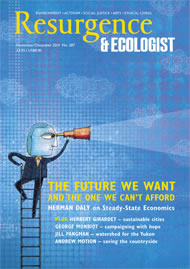Fritz Koenig’s sculpture The Sphere is a giant bronze globe that symbolises world peace through trade. Commissioned to mark the opening of the World Trade Center in Manhattan, it stood for 30 years in the open public plaza between the two towers – a popular spot for workers having their lunch. In the September 2001 attacks, the sculpture was scarred and holed, but it survived. “It was a sculpture; now it’s a monument,” said Koenig afterwards. “It now has a different beauty, one I could never imagine.”
The idea that free exchange could enrich those who take part and bind them in peace and prosperity has informed the field of economics from the earliest days, explains Philip Roscoe. Today, economics as a discipline is more influential than ever, extending into a confident ‘economics explains everything’ genre of books, from global policy through to trivia on why cups of coffee in railway stations are so expensive or whether swimming pools are more dangerous than guns.
And yet, as the story of Koenig’s sculpture suggests, conflict remains. “The discipline’s Enlightenment pioneers”, Roscoe writes, “would have struggled to imagine a world where more prosperity, more goods and more wealth could somehow impoverish us, but contemporary psychologists have proved what philosophers have long claimed: increases in wealth and status can make us unhappy.”
Roscoe is an academic at the University of St Andrews, with an eclectic eye in terms of research around economic life. He draws on his own experience in an investment firm to assess the way in which “individuals, failed by mainstream finance, are forced to fend for themselves in an unfriendly market where they become the prey of those very same financial institutions.” He looks at how online dating and university rankings start by offering descriptions to help people make choices, but end up changing those choices fundamentally – reducing “a social good, rich in intrinsic worth … to an instrumental, short-term lever for personal advancement.”
In health, he looks at the rise of the Quality Adjusted Life Year (QALY) as a way to guide decisions on who gets what. This is calculated by the number of years you have left to live, multiplied by the expected quality of those years, with 1 being perfectly healthy, 0 being dead, or even −1, worse than dead. “The defence of the QALY is, of course, that it saves us from the arbitrary nature of human judgement … but if we pursue and identify each of the decisions that has gone into its construction, we will arrive at moments of expert judgement and, equally arbitrary, assumptions.”
Economics is not, therefore, just about description. As we internalise “the rules, and expectations of economic governance … so we become the very creature on which economic theory is based”. Roscoe is not alone in arguing this, and the only weakness of this readable and important book is that it sidelines the long and rich history of economic dissent that challenges and, critically, provides alternatives to the orthodox view.
The risk of mainstream economics is that it can imprison us. Roscoe retells the story of Nicholas Stern on climate change – “a respected figure, an expert, a pillar of the global establishment, [who] tells us that nearly half of the world’s species may cease to exist if temperatures rise by as little as 2 degrees C, and that there will be 200 million refugees sleeping out on Europe’s collective lawn”. Instead of exploring this, the debate that followed among the policy elite was about the discount rate that Stern had applied in his analysis. Because Stern’s argument was framed in the language of economics, it then became a debate about method, not about ethics.
“Once the discussion has been dragged onto economic terrain,” the author concludes, “it can only be settled with calculators and spreadsheets.”







